Cleveland State University College of Law (1969-Present)
Formerly CLEVELAND-MARSHALL COLLEGE OF LAW
- Carolyn Broering-Jacobs; Brian Ray (2025-Present; Interim Co-Dean)
- Lee I. Fisher (2017-2025; Interim 2016)
- Craig M. Boise (2011-2016)
- Phyllis L. Crocker* (2010-2011)
- Geoffrey S. Mearns (2005-2010)
- Steven H. Steinglass (1997-2005; Interim 1996)
- Steven R. Smith (1988-1996)
- Lizabeth A. Moody* (1987-1988)
- Robert L. Bogomolny (1977-1987)
- Hyman Cohen* (1975-1977)
- Craig W. Christensen (1971-1975)
- Howard L. Oleck* (1971)
- James K. Gaynor (1969-1971)
Cleveland-Marshall Law School (1946-1969)
John Marshall School of Law (1916-1946)
Cleveland Law School (of Baldwin University) (1897-1946)
- Lee E. Skeel (1937-1946)
- Melville Willis Vickery (1932-1937)
- Willis Vickery (1914-1932)
- Charles S. Bentley (1897-1914)
* Interim Dean
Cleveland state university College of Law (1969-Present)
Formerly CLEVELAND-MARSHALL COLLEGE OF LAW
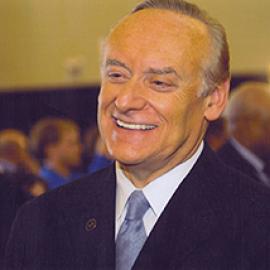
Lee I. Fisher (2017-2025; Interim 2016)
- M.N.O, Case Western Reserve University
- J.D., Case Western Reserve University School of Law
- B.A., Oberlin College
Lee Fisher was appointed Interim Dean and Visiting Professor of Law at Cleveland State University College of Law during the 2016-17 academic year and began his tenure as dean the following year.
Among a diverse career spanning the private, public, nonprofit and academic sectors, Fisher is most widely known for his extensive public service, having served as Attorney General of Ohio from 1991-1995, where he managed 1,200 employees, including 350 attorneys and 23 legal divisions, and as Lieutenant Governor of Ohio with Governor Ted Strickland from 2007-2011. Prior to those terms, he spent eight years as an Ohio State Senator and two years as an Ohio State Representative.
Additionally, Fisher has decades of experience in legal practice, most extensively with Cleveland-based Hahn Loeser & Parks as Of Counsel from 1978-1990 and Partner from 1995-1999. Prior to his appointment at CSU|LAW, he was the President and CEO of CEOs for Cities, a nationwide innovation network for city success, and currently serves as a senior advisor to the organization. He previously served as Director of the Ohio Department of Development, where he managed a budget of $1 billion, and President and CEO of the Center for Families and Children, where he led the largest capital campaign in the organization’s history.
The Cleveland resident has previous experience at CSU, having taught as an Adjunct Instructor at the law school in 1978 and formerly serving as a Senior Fellow with the Center for Economic Development at CSU’s Levin College of Urban Affairs.
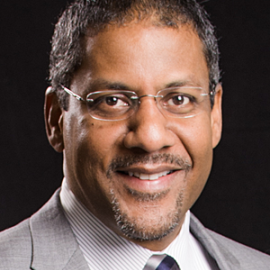
Craig M. Boise (2011-2016)
- LL.M., New York University School of Law
- J.D., University of Chicago Law School
- B.A., University of Missouri-Kansas City
During his five-year tenure as dean at Cleveland-Marshall College of Law, Craig Boise established one of the country’s first solo practice incubators, developed a master’s degree in legal studies, and launched the Center for Cybersecurity and Privacy Protection.
Boise previously held a faculty position at DePaul University College of Law, where he directed the Graduate Tax Program and Institute for Offshore Financial Center Studies. Prior to joining the DePaul faculty, he was assistant and associate professor of Law at Case Western Reserve University School of Law, where he also served as associate director of the Center for Business Law and Regulation. He is currently the dean at Syracuse University College of Law.
Before coming to academia, Boise practiced law for over eight years, including as a senior tax associate in the Cleveland office of Thompson Hine. Before entering private practice, he clerked for the Honorable Pasco M. Bowman II of the U.S. Court of Appeals for the Eighth Circuit.
Initially choosing a career in law enforcement, he worked for the Kansas City Police Department for five years, including a stint with the SWAT team. The 4th, 5th and 6th Amendment constitutional law cases that he learned in the police academy sparked an interest in law, which led him to go back to college and finish his BA in Political Science, and from there, to obtain his JD. He later earned his LLM in Taxation.
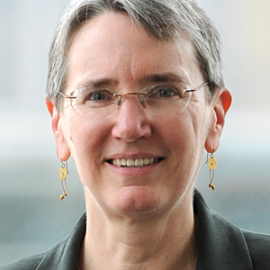
Phyllis L. Crocker* (2010-2011)
- J.D., Northeastern University School of Law
- B.A., Yale University
Phyllis Crocker was on the faculty at Cleveland-Marshall College of Law from 1994 to 2014. She also served as Associate Dean for Academic Affairs (2006-2010) and Interim Dean of the school (2010-2011). In her role as Associate Dean for Academic Affairs, she was involved in and responsible for some of the most important programs and initiatives at the law school, including efforts to recruit a more qualified and diverse student body and the development of a new strategic plan for the career planning office. She also successfully led the law school's efforts to substantially expand the number of externship opportunities for its students.
Crocker taught Criminal Law, Criminal Procedure, Civil Procedure, and seminars related to capital punishment. She also had leadership roles on many important law school and University committees, including serving as Vice Chair of the 2004 Law Dean Search Committee.
After graduating from law school, she clerked for the Honorable Warren J. Ferguson of the United States Court of Appeals for the Ninth Circuit. She was then an associate in a small Chicago firm that specialized in complex federal civil litigation. From 1989 until 1994, she was a staff attorney at the Texas Resource Center in Austin, which is a federally funded community defender organization that represents death row inmates in post-conviction litigation.
Crocker is a recognized expert on the death penalty. She chaired the American Bar Association's Ohio Death Penalty Assessment Team and has written extensively on the constitutional, historical, and cultural foundations of capital punishment.
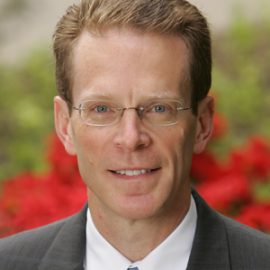
Geoffrey S. Mearns (2005-2010)
- J.D., University of Virginia
- B.A., Yale University
Geoffrey Mearns served as dean and professor of law at Cleveland-Marshall College of Law from 2005-2010. During his tenure at Cleveland-Marshall, the performance of the school’s graduates improved as he helped to increase their Ohio Bar Examination passage rates. He continued to attract extraordinary students and faculty, which improved the quality, reputation, and diversity of the law school. He also supervised the renovation of the law building, including the addition of a trial courtroom. The law school received increased financial support from lawyers and law firms in the community as a result of his efforts.
He then served provost and senior vice president for academic affairs at Cleveland State University from 2010-2012. In this role, he led the most successful reaccreditation process in CSU's history and co-chaired a taskforce that developed the school’s new budget methodologies. He also spearheaded the university’s efforts to improve undergraduate retention and graduation rates. Mearns helped to create the new Center for Health Law and Policy and supervised an $8.8 million law school renovation. In his seven months as interim provost, he helped realign the science and nursing programs to greatly improve the health science education across various programs.
Prior to joining CSU, Mearns had a distinguished career as a prosecutor with the United States Department of Justice, where he was responsible for investigating, prosecuting, and supervising cases against members and associates of organized-crime families. As Special Assistant to the United States Attorney General, Mearns participated in the prosecution of Terry Nichols, one of two men convicted for bombing the Oklahoma City Federal Building.
His extensive record of community service includes serving as chair of three federal judicial screening committees and as a trustee for several Cleveland nonprofit agencies. He was also a member of the National Academy of Sciences Committee on Identifying the Needs of the Forensic Science Community.
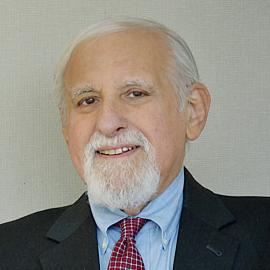
Steven H. Steinglass (1997-2005; Interim 1996)
- LL.B., Columbia University School of Law
- B.S., University of Pennsylvania, Wharton School of Finance and Commerce
Steven Steinglass joined the faculty of Cleveland-Marshall College of Law in 1980. He served as associate dean for two years and interim dean for a year before becoming dean in 1997, where he served until 2005 when he returned to the faculty and was appointed dean emeritus. During his tenure as dean, the law school sponsored more than 20 academic and professional conferences. He presided over the school’s centennial celebration in 1997 and the opening of the new law library. Steinglass greatly strengthened the law school’s ties with the Cleveland legal community and increased its influence and reputation both regionally and nationally.
In the fall 2011 semester, Steinglass was a Distinguished Visiting Professor of Law at Widener University School of Law (Delaware); in the spring 2012 semester, he was a visiting professor at Case Western Reserve University School of Law; and in the 2012-13 academic year, he was Distinguished Visiting Professor at St. Louis University School of Law. Currently, Steinglass serves as Senior Policy Advisor for the Ohio Constitutional Modernization Commission.
Following law school, Steinglass practiced law in Wisconsin, initially as Staff Attorney under the Reginald Heber Smith Fellowship Program and ultimately as Director of Legal Action of Wisconsin, Inc., the state's largest legal services program. He also served as a Lecturer in Law at the University of Wisconsin Law School.
Steinglass’s teaching areas included Civil Procedure, Federal Jurisdiction, Section 1983 Litigation, State Constitutional Law, and Ohio Constitutional History. He is a nationally known expert on Section 1983 Civil Rights Litigation and a frequent lecturer at continuing legal and judicial education programs throughout the country. He is the author of a leading treatise on civil rights and numerous law review articles and book chapters. He also co-authored The Ohio State Constitution (2011). Steinglass has argued two cases before the United States Supreme Court: Board of Regents v. Roth (1972) and Felder v. Casey (1988).
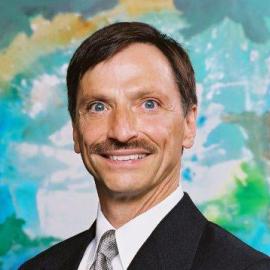
Steven R. Smith (1988-1996)
- J.D., University of Iowa
- M.A., University of Iowa
- B.A., Buena Vista College
When Steven Smith was appointed dean of the Cleveland-Marshall College of Law in 1988, the school’s law library collection was the second-largest academic law collection in the state and had outgrown its given space. Recognizing the need for a new facility to accommodate the expanding holdings and increasingly necessary electronic resources, Smith and the new law library director organized efforts to secure funding for a new law library building. He also established a mentor program between faculty and alumni. In his final year as dean, Cleveland-Marshall was given national recognition in U.S. News and World Report as a top ten school in the area of Health Law.
Smith went on to serve as dean of California Western School of Law for 15 years, during which time the school established a joint Master’s degree in health law with UC San Diego and two dual-degree programs with San Diego State University, expanded its course offerings and areas of concentration, launched the California Innocence Project, and received state and national recognition for pro bono service.
He had previously served as a law professor, associate dean, and acting dean at the University of Louisville School of Law. Smith was Deputy Director of the Association of American Law Schools (AALS) in 1987-88. He remains active in AALS and in the work of the American Bar Association, where he was vice chair and chair of the Section of Legal Education and Admissions to the Bar from 2003-2006.
Smith has received awards for innovative teaching, research and creative activity, and distinguished service and has developed and taught courses and seminars on Health Law and Mental Health Law. He has published widely in law and psychology and law and medicine.
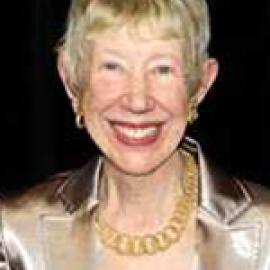
Lizabeth A. Moody* (1987-1988)
- J.D., Yale University
- A.B., Columbia University, Barnard College
Lizabeth Moody was a Cleveland-Marshall College of Law professor of law for 20 years and served as interim dean for just over a year. She became the second female member of the tenure-track faculty in 1970, and in 1972 Moody and fellow professor Jane Picker created the Women’s Law Fund (WLF), the first nonprofit organization in the nation to specialize in sex-discrimination cases. In 1974, she was appointed by the Ohio Supreme Court to be one of the first commissioners to the Ohio Public Defender Commission. During the seven years she served, she drafted many of the rules adopted by the Commission.
She is currently a distinguished university professor at Stetson Law and was the school’s vice president and dean from 1994-1999. During her tenure as dean, she opened a state-of-the art Law Library and laid the foundation for the college’s part-time law and international programs. She teaches in the areas of corporate and securities law, with an emphasis on nonprofit corporations and professional responsibility.
Moody served as president and CEO of Law Schools Admission Services and executive director of the Law School Admission Council from 1991-93. In 1987, she was the first woman to be elected president of the Cleveland Bar Association. Before entering academia, she made partner at the prominent Cleveland law firm of Metzenbaum, Gaines & Stern despite the challenges faced by female lawyers in that era.
Moody was one of the first female lawyers rated AV® by LexisNexis Martindale-Hubbell. Awards received include: the Josephine Irwin Award honoring women who have championed social justice for women, the American Bar Association Section of Business Law’s Glass Cutter Award for her extraordinary efforts in paving the way for women in the legal profession, and the Ohio State Bar Medal, the association’s highest honor. As recognition for her many accomplishments, the city of Cleveland declared May 8, 1990 Lizabeth A. Moody Day.
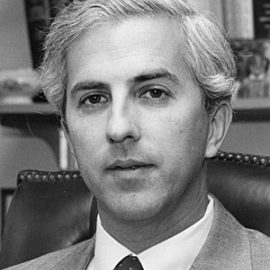
Robert L. Bogomolny (1977-1987)
- J.D., Harvard University
- B.A., Harvard University
A native Clevelander, Robert Bogomolny was a professor of law and dean at Cleveland-Marshall College of Law from 1977 to 1987. During his tenure as dean, he led a fund drive to increase the size and scope of the library’s collection, which doubled in size as a result. He also implemented two faculty self-study reports and fought to increase the number of faculty positions for an improved faculty-student ratio.
Bogomolny served as president of the University of Baltimore from 2002-2014, drawing upon his background spanning the academic, legal, and corporate worlds to make enormous contributions to the evolution of the university: enrollment grew by more than 30 percent, a four-year undergraduate program was reintroduced, an innovative new law school was funded and built, and more than $275 million in public and private capital was invested in the campus and midtown area as a result of his leadership.
Before his time at Cleveland-Marshall, Bogomolny held the position of professor of law at Southern Methodist University School of Law. Other positions held include assistant director of the Vera Institute of New York, a criminal justice research entity; assistant chief counsel to the U.S. Department of Health, Education, and Welfare's Bureau of Drug Abuse Control; special assistant to the U.S. Attorney for the District of Columbia; attorney in the criminal division of the U.S. Department of Justice; and associate for Burke, Haber & Berrick in Cleveland.
Between his stints at Cleveland-Marshall and UB, Bogomolny was corporate senior vice president and general counsel for G.D. Searle & Company, an international pharmaceutical company. While at Searle, he was responsible for all legal activities of the company, including its legal, regulatory, quality control, and public affairs departments. He also led the company's government affairs department in Washington, D.C. and served on the Searle Executive Management Committee.
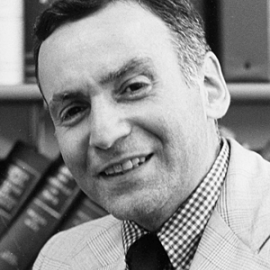
Hyman Cohen* (1975-1977)
- LL.M., New York University School of Law
- J.D., New York University School of Law
- B.A., City College of New York
Hyman Cohen began teaching at Cleveland-Marshall College of Law in 1967, specializing in the areas of administrative law, arbitration practice, labor law, and torts. He served as interim dean for two years, during which time he encouraged the school’s “truly outstanding faculty” to persevere in the research, academic programs, and other activities in which they were engaged.
During his tenure at Cleveland-Marshall, he was chairman of the Cleveland Bar Association’s Administrative Law Committee, a member of the Legal Aid Society and the Board of Governors of the Ohio State Bar Association, and a member of the American Bar Association’s Committee on Judicial Review of the Administrative Law Committee.
Cohen served as chair of the Education Committee of the American Arbitration Association’s Regional Advisory Council in addition to arbitrating for the Association’s Dispute Settlement Center. He was also a hearing examiner for the Ohio Civil Rights Commission. In the summer of 1969, he was a special assistant at the Federal Power Commission in Washington D.C.
Before joining the faculty at Cleveland-Marshall, Cohen practiced law with a private firm in New York City and also with the U.S. Housing and Home Finance Agency. He previously served on the faculty at Pace College and City College of New York. He also worked as a consultant to the Administrative Conference of the United States and received a grant from the National Endowment for the Humanities.
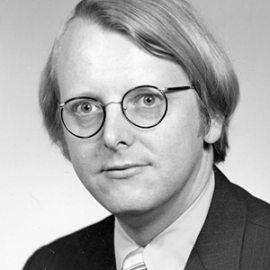
Craig W. Christensen (1971-1975)
- J.D., Northwestern University
- B.S., Brigham Young University
Craig Christensen began his career in legal education as executive director of the National Institute for Education in Law and Poverty and lecturer at Northwestern University. He then served as legal advisor to the president and associate professor of law at the University of Michigan before accepting the dean post at Cleveland-Marshall College of Law in 1971. During his time at Cleveland-Marshall, the Legal Career Opportunities Program (LCOP) was created, three clinics were established, more full-time faculty were hired, and procedures for tenure were formalized.
Christensen was appointed dean at Syracuse University College of Law from 1975-1988. He then served as president and executive director of the Law School Admission Council (LSAC) for nearly five years followed by a year as visiting professor of law at Hastings College of Law. He joined the faculty at Southwestern Law School in 1992 and became professor of law emeritus in 2006 upon his retirement.
Following law school, where he served as editor-in-chief of the Northwestern University Law Review, Christensen practiced law with the Chicago firm of Kirkland & Ellis and later served as executive assistant to the chairman and president of the Chicago and Northwestern Railway Company.
Long active in the area of gay rights, Christensen serves on the National Advisory Committee of the Law and Sexuality Journal. He is a former member of the Board of Directors of the LAMBDA Legal Defense and Education Fund and the New York State Human Rights Political Action Committee, a past chair of the State of New York's Task Force on Gay Issues, and founding chair of the Association of American Law Schools Section on Gay and Lesbian Issues.
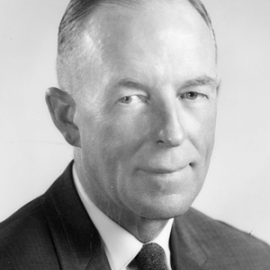
James K. Gaynor (1969-1971)
- S.J.D., George Washington University
- LL.M., George Washington University
- J.D., Indiana University
- B.S., Indiana University
Overseeing the school’s merger with Cleveland State University, James Gaynor was a professor and served as dean of the renamed Cleveland-Marshall College of Law from 1969 to 1971. During his brief tenure, he was successful in enlarging the law school’s full-time faculty and acquiring membership for the school into the Association of American Law Schools (AALS), which was critical to the school’s future.
Gaynor previously served as a professor at the Salmon P. Chase College of Law in Cincinnati and Northern Kentucky University. He taught military science at Indiana University and law courses at both the University of California and the University of Maryland.
Prior to his years in academia, Gaynor began a military career as a private in the Indiana National Guard in 1934 and made captain by the time the U.S. entered World War II. He enlisted in the Army in 1941, serving first as an infantry officer and later in intelligence with Headquarters V Corps, where he attained the rank of lieutenant colonel. He landed on Omaha Beach in Normandy on D-Day and was involved in every major engagement in Northern Europe.
After the war, he briefly served with the Joint Chiefs of Staff before returning to school. He later reenlisted in the service and started a long tenure in Army's Office of the Judge Advocate General. He was also the Army's Chief Legislative Counsel from 1957 to 1960 and later served as legal advisor to all American forces in the U.S. European Command. Gaynor's Army decorations include the Legion of Merit, Bronze Star with an Oak Leaf Cluster, and the French Croix de Guerre, France's highest military award.
Gaynor authored many articles for sports, military, and university publications, as well as Encyclopedia Britannica. He had two law-related books published after he retired.
Cleveland-Marshall Law School (1946-1969)
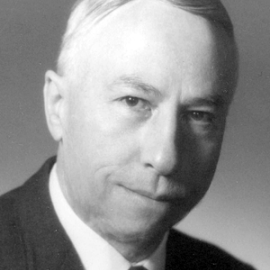
Howard L. Oleck* (1967-68; 1971)
- J.D., New York Law School
- B.A., University of Iowa
Howard Oleck began teaching law and researching nonprofit corporations while on the faculty of New York Law School. Between the years of 1956 and 1974, he served as a widely respected professor of law, assistant dean, and twice as interim dean at Cleveland-Marshall College of Law. During his tenure, he was faculty advisor for the Cleveland-Marshall Law Review, chair of the ABA Legal Education Standards Committee, President of the League of Ohio Law Schools, an advisor to Congressman Wright Patman's Commission on Non-Profit Organizations, president of Scribes, and chairman of the AALS Roundtable of Remedies.
Later he moved to Wake Forest University School of Law for several years before joining the Stetson law faculty in 1978. He retired in 1981 but continued to teach courses on nonprofit organizations at Stetson. The title of distinguished professor emeritus was bestowed upon him at both Cleveland-Marshall and Stetson.
Oleck was a prolific writer and scholar. He authored 21 treatises, including six editions of his monumental multi-volume treatise Nonprofit Organizations as well as the six-volume treatise Modern Corporation Law. He authored several other law books, including Parliamentary Law and Practice for Nonprofit Corporations as well as Oleck's Tort Law Practice Manual. He drafted several state nonprofit statutes while serving as a member of the Legislative Commission on Nonprofit Corporations.
Oleck also authored three published novels, one of which became the basis for a television mini-series. He honed his writing skills during World War II: after serving in Europe as a tank commander under General Patton, he was assigned to the Allied Headquarters as an official Army war historian where he interviewed U.S. and Allied commanders daily regarding the war's developments.
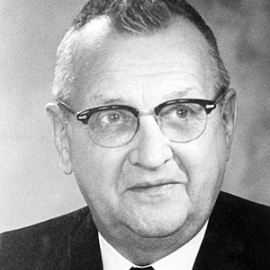
Wilson G. Stapleton (1946-1967)
- M.S., Western Reserve University
- J.D., Cleveland Law School
- B.A., Boston University
In 1945, Wilson Stapleton was the moving force in the merger of the Cleveland Law School and the John Marshall School of Law. From 1946 until his retirement, he served with distinction as dean of Cleveland-Marshall Law School. Stapleton's many contributions to the school include obtaining accreditation, enriching the library, recruiting faculty, and planning for future growth. He envisioned a school that would provide quality legal education at reasonable costs primarily for Cleveland area students. Under his guidance, many young persons were provided with an opportunity to obtain a legal education that otherwise would have been out of reach.
Stapleton was a unique combination of scholar and politician, which led him naturally into teaching, school administration, and public service. He was active as a civic, educational, community, and legal professional leader. His scholarship was established in Nova Scotian schools, where he developed a life-long interest in English classical literature. He was a councilman and later mayor of Shaker Heights while also teaching and maintaining an active law practice.
He began his academic career after five years’ service as a pilot in the United States Army. He graduated from Boston University in 1928 with high honors and was elected to Phi Beta Kappa. He then came to Cleveland where he served as a member of the faculty at University School before attending Cleveland Law School. During his law school years, he became first a title examiner and later a title officer, graduating in 1934. He joined the law school faculty the following year.
After retiring in 1967, he became the oldest applicant to ever take and successfully pass the Bar examination in the state of Florida, where he set up a practice near his winter home.
John Marshall School of Law (1916-1946)
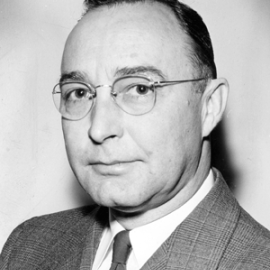
David C. Meck, Jr. (1939-1946)
- B.A., Harvard College
- LL.B., Western Reserve University School of Law
David C. Meck, Jr. served on the faculty of John Marshall School of Law from 1930-1939 before becoming dean. He guided the growth and progress of the school until it merged with Cleveland Law School in 1946 to become the Cleveland-Marshall Law School. He served as director of education, a member of the executive committee, and a trustee of the successor school.
Meck was educated in Cleveland Public Schools. He went on to Harvard College before attending the Western Reserve University School of Law, where he was an honor student and member of the Order of the Coif when he graduated in 1930. He was recognized with an honorary of Doctor of Laws degree by Wilberforce University in 1952.
Meck began practicing law in 1935, embarking upon an outstanding record of public service. He served as assistant police prosecutor for the city of Cleveland from 1935-1938, assistant city law director from 1938-1941, and regional supervisor of the Federal Security Agency from 1942-1944. He was elected to the Municipal Court of Cleveland in 1943. During his early tenure as a municipal judge, he was called to service and performed as a consultant to the American Economic Mission in the Middle East. After performing his mission, he returned to the court from which he had been granted a leave of absence and was reelected to another six-year term in 1949.
Meck was a member of the Cleveland, Cuyahoga County, Ohio, and American Bar Associations and served as president of the League of Ohio Law Schools.
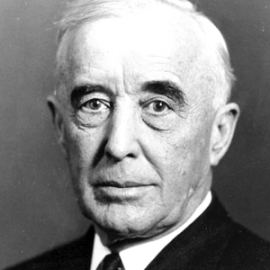
David C. Meck, Sr. (1916-1939)
- LL.B., Cleveland Law School
- M.A., Ohio Wesleyan University
- A.B., Ohio Northern University
In 1916, David C. Meck, Sr., along with several other attorneys, founded the John Marshall School of Law, which offered both an afternoon and a night program. He served as a member of the faculty, teaching Contracts and Bailments & Carriers, and as dean until his death in 1939 when he was succeeded by his son, David C. Meck, Jr. He was known as a leader who understood and supported his students’ endeavors to obtain a professional education.
Prior to his decades of service to the law school, Meck taught briefly at Ohio Wesleyan University, where he had obtained a master’s degree. He then became head of the Mathematics Department at West High School and later at East Technical High School, both in Cleveland.
In 1924, the Governor of Ohio appointed him to the Municipal Bench of Cleveland. He was elected to a six-year term in 1925 and retired from the bench in 1931. During his tenure there, he took a firm stand against admitting evidence that had been illegally obtained, as demonstrated when he punished two officers who had testified that they had search warrants when evidence showed that they had not.
Meck was widely known in educational and legal circles. He was a Mason, Odd Fellow, and Pythian and a member of the Cleveland Bar Association, Ohio State Bar Association, and the American Bar Association.
Cleveland Law School (of Baldwin University) (1897-1946)
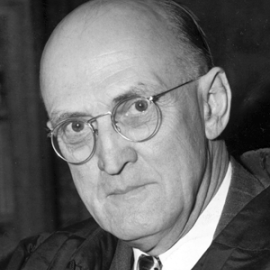
Lee E. Skeel (1937-1946)
- LL.B., Cleveland Law School
- B.A., Hiram College
Lee E. Skeel taught at Cleveland-Marshall Law School and its predecessor, Cleveland Law School, beginning in 1926. He served as dean of Cleveland Law School for nearly a decade before taking on the role of president for almost 20 years after Cleveland Law School and John Marshall School of Law merged to form the Cleveland-Marshall Law School. Following his tenure as president, he served as Chief Administrative Officer and a trustee for several more years prior to his death in 1968.
Skeel was born in White City, Kansas in 1888 but was a life-long resident of Cleveland. He immediately began practicing law upon his graduation from Cleveland Law School in 1912, but his practice was interrupted by a period of service with the 322d Machine Gun Battalion in France during World War I. He received an honorable discharge in 1919 and resumed his law practice in Cleveland.
After returning from the war, he became Chief Counsel for the Cleveland Automobile Club from 1920-1922. He served as an executive officer of the Cleveland Safety Council, Ohio State Safety Council, and National Safety Council. He served successively as Chief Police Prosecutor of the city of Cleveland, Judge of the Municipal Court of Cleveland, Judge of the Court of Common Pleas of Cuyahoga County, and Judge of the Ohio Eighth District Court of Appeals.
Skeel authored, edited, and revised several volumes, including Baldwin’s Ohio Criminal Law: A Guide to Criminal Law and Practice in Ohio, Ohio Appellate Law: A Treatise on Appellate Practice with Procedure Outlines, Law, Forms, and Rules, and Skeel’s Appellate Law, Practice, and Forms: A Complete Ohio Appellate Manual. He was a member of the Ohio State Bar Association and was active in the American Legion.
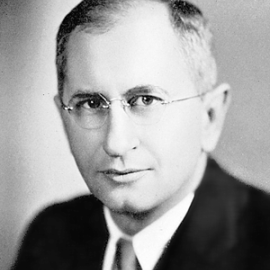
Melville Willis Vickery (1932-1937)
- LL.B., Cleveland Law School
- B.S., Case School of Applied Science
Melville Willis Vickery began teaching at Cleveland Law School in 1922 and accepted the position of dean upon his father’s death in 1932, serving in that role until his death in 1937.
Born in Bellevue, Ohio, Vickery attended the public schools of Cleveland, graduating from East High School in 1907. He earned a Bachelor of Science degree from Case School of Applied Science in 1911 before attending law school. He graduated from Cleveland Law School in 1914 and was subsequently admitted to the bar of Ohio. He joined the United States District Court Northern District of Ohio in 1915.
Vickery was a first lieutenant and sat on the board of reviews of the judge advocate’s department to hear court martial appeals in France during World War I. Upon his return from the war, he became a member of the firm of Ewing, Lind & Vickery. In 1933, he was employed as a special prosecutor in a case involving the constitutionality of law governing the practice of dentistry in Ohio. He was a candidate for judge of both the Common Pleas Court and Court of Appeals.
Vickery was a member of the Cleveland, Cuyahoga County, and Ohio State Bar Associations, Lakewood Board of Education, American Legion, Veterans of Foreign Wars, Cleveland Grays, Loyal Order of Moose, and Knights of Pythias. He was also a member of the executive committee of the League of Ohio Law Schools.
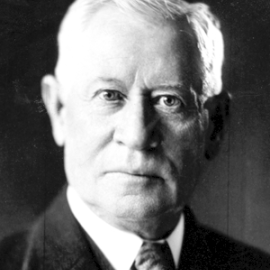
Willis Vickery (1914-1932)
- LL.B., Boston University
Along with Charles S. Bentley, Willis Vickery was influential in the organization of the Cleveland Law School of Baldwin University, where he taught before becoming dean in 1914. Upon his death in 1932, his son Melville Willis Vickery succeeded him as dean.
Vickery was born in Bellevue, Ohio in 1857. He graduated high school in 1880 and studied law while teaching in the public schools until entering the law department of Boston University, from which he graduated in 1884. In 1885, he formed a law partnership with his brother Jesse and they opened an office in Bellevue until Vickery came to Cleveland in 1896.
In Cleveland, Vickery continued his practice until he earned a place on the bench of the Common Pleas Court of the fourth subdivision of the third judicial district of Ohio in 1909. He was elected to the Court of Appeals in 1918, on which he served until his death. On the bench, Vickery was required to render decisions in many important cases, including a number affecting the welfare of the city of Cleveland.
Vickery was known as a bibliophile and a man of exceptional culture who was popular lecturer on literary subjects and wrote several essays on book-collecting. He had one of the best private libraries in Cleveland and served as president of the New York Shakespeare Society in addition to being a member of the Bibliophile Society of Boston, the Carteret Book Club of Newark, New Jersey, and the Rowfant Club of Cleveland. He also served as president of Rowfant Bindery Company, known for its great artistic work in the binding of books. He was affiliated with the Masonic fraternity and Knights of Pythias and was a member of the Cleveland Chamber of Commerce.
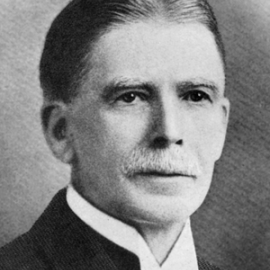
Charles S. Bentley (1897-1914)
- M.A., Hillsdale College
- B.A., Hillsdale College
Charles S. Bentley was one of the organizers of Cleveland Law School of Baldwin University and took on the role of dean at its inception in 1897.
Bentley was born in Chagrin Falls, Ohio in 1846. In 1864, he entered the Eclectic Institute in Hiram, Ohio. He then took a course at Eastman’s Business College before clerking in a country store for three years in Mantua, Ohio. While in the wholesale lumber business in Allegan, Michigan, he took up the study of law with Colonel Benjamin D. Pritchard, a prominent lawyer and banker.
He came to Cleveland in 1872 and studied law in the office of Darius Caldwell before being admitted to the bar later that year. He was simultaneously admitted to practice in the federal courts. He practiced briefly in Cleveland with the firm Barber & Andrews before moving to Bryan, Ohio and forming a partnership with Albert M. Pratt. The law firm of Pratt & Bentley continued from 1873 to 1887. In 1874 he was elected city solicitor of Bryan and in 1875 was elected prosecuting attorney of Williams County.
Bentley served as a judge on the Circuit Court of the Sixth District of Ohio from 1887-1895. While on the bench, he was required to address notable subjects of litigation for which his work was considered pioneering: the extended use of petroleum, natural gas, and electricity as a motive power. Some of the cases that Bentley handled as a judge established important precedents and principles in the law dealing with these forms of public utility.
Bentley returned to Cleveland in 1896 and practiced for several years as a partner with Charles H. Stewart before serving as dean. In the latter part of 1910, Bentley joined an already-established firm run by Charles Biggs, which came to be known as Bentley & Biggs. He was a Scottish Rite Mason and a member of the Cleveland Law Library, Cleveland Bar Association, Ohio State Bar Association, and Cleveland Chamber of Commerce.
